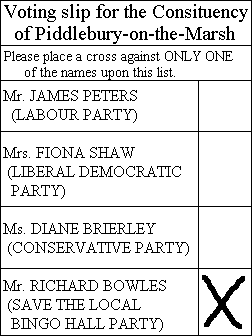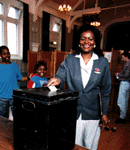General Elections
As part of British Democracy, every few years the country has a General Election. This is the process by which the Members of Parliament, or MPs, are chosen. The MPs are the people who represent ordinary people in the House of Commons. At the moment, the members of the House of Lords are not elected, although there are plans to change that.
General Elections must happen within 5 years of the previous election (as specified in the Parliament Act, 1911). However, the Prime Minister can choose to call a General Election earlier if he or she thinks it is appropriate. This means that elections can be closer together than 5 years. The Prime Minister generally chooses the date of the election at a time when he/she thinks that his/her party is at its most popular! For instance, there was a general election in May 1997, which brought the Labour Government to power under Prime Minister Tony Blair. Blair had to call an election before May 2002, which was the five year limit. In fact, he decided to set the date for the election in 2001, as he thought the Labour Party had a good chance of winning then. He was right - they were swept back into power with a great majority of the votes.
When an election happens, the British Isles are divided into almost 650 small areas, called constituencies. Each constituency represents a certain number of people, generally about 10,000, and each constituency has its own MP. This means that there are approximately 650 MPs in the Houses of Commons.
For about a month before the election takes place all the political parties campaign for votes. They use newspaper advertisements, short television broadcasts (called Party Political Broadcasts), leaflets and as many visits from the candidates standing for Parliament as possible to persuade voters to vote for them. This is the time when everywhere you look you see candidate MPs shaking hands with as many ordinary people as they can and promising them that their particular party is the only one that can improve the situation.
Although there are three main political parts (the Conservatives - also known as the Tories - the Labour Party and the Liberal Democratic Party) which choose their own candidates from among their members, almost anyone can stand as a candidate in their own particular constituency. Indeed, a rich individual called Screaming Lord Sutch used to stand at every election for a Party which he had himself founded, called the Monster Raving Looney Party. Needless to say, he was never elected!
To register as a candidate, a person has to pay a certain sum of money (currently £1000) to the proper authorities called a deposit. This is to discourage people from standing as candidates if they don't have a strong commitment to a cause. Any candidate who gets more than a certain percentage of the vote (about 10%) gets their deposit returned to them - the candidates who obtain fewer votes than this "lose their deposit."
|
The date of the General Election is traditionally a Thursday. Several polling stations (places where votes can be legally cast) are set up in each constituency - usually in places like schools (children love elections as they get a day off school!), tennis clubs, town halls etc. People arriving at the polling stations hand over a small postcard that has been sent to them in the post in order to prove their identity. They are then given a voting slip (also called a ballot paper) similar to the one shown here and directed into a private booth.
Having marked a large black cross against the candidate they want to vote for, the voter folds the slip in half to conceal the vote, and places it in a large padlocked box through a slot in the top. These boxes are carefully guarded by officials to ensure that no cheating happens.
|
 |

A woman casting her vote |
The polling stations close at 10 o'clock at night and then the boxes are taken under guard to a central counting station for the constituency. Counting of the votes goes on through the night and it is often several hours before the result of all the counts is known. The candidate who receives the most votes in each constituency is elected as the Member of Parliament for that constituency, and can then sit in the House of Commons. The party which has the most MPs then becomes the governming party, and the leader of that party is invited by the monarch (the Queen) to become the (new) Prime Minister.
|
Further points:
- As you might expect, there is a great deal of coverage of an election on the television, radio and in the newspapers. Each television channel has its own programme which goes on through the night and records the progress of the political parties as the results come in from the different constituencies.
- All voting is done in secret. There is no obligation to tell anyone which party you voted for, and the voting slips do not bear the voter's name, so no-one can work it out afterwards. However, the names of people voting are recorded so that the authorities know if anyone tries to vote twice.
- Any ballot paper which has had two votes drawn on it, or which has been "defaced" (i.e. ruined in some way) is called a "spoiled" ballot paper, and is ignored when the votes are counted.
- Any candidate who feels that he has been cheated can demand that the votes for his/her constituency are recounted. Mistakes do sometimes happen, and if a candidate has only lost by a few votes, it is worth demanding a recount.
A good web site for further information is: www.parliamentaryelection.com
 Go Back
Go Back


 Go Back
Go Back